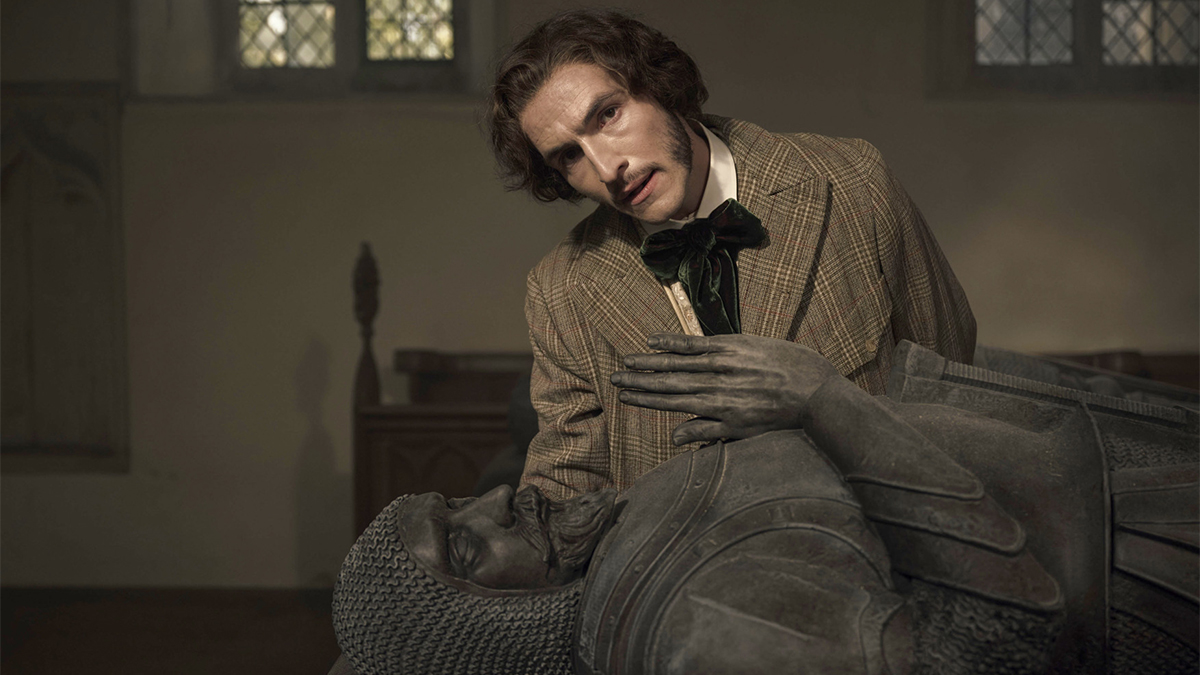
Warning: contains spoilers for “A Ghost Story for Christmas: Woman of Stone”.
Each of the five short stories adapted by Mark Gatiss so far for the BBC’s revived A Ghost Story for Christmas strand (M.R. James’ “The Tractate Middoth”, “The Dead Room”, “Martin’s Close”, “The Mezzotint” and “Count Magnus”, plus Arthur Conan Doyle’s “Lot No. 249”) retained their original titles on screen. This year’s doesn’t. Gatiss has reshaped Edith Nesbit’s 1887 tale “Man-Size in Marble” under the new name “Woman of Stone”.
Woman of stone? Nesbit’s ghost story famously features two men of stone – marble effigies of medieval knights flanking the altar of the church in the village where Victorian newlyweds Jack and Lucy Lorimer (Éanna Hardwicke and Phoebe Horn) have recently taken a cottage. Once a year, as the Lorimer’s housekeeper relays, the knights are rumoured to rise from their slabs and walk to their former home, which once stood on the same site as the Lorimer cottage, and where many years ago, according to Mrs Dorman, “…there was many a deeds done.”
The only women in the story are flesh-and-blood Lucy and Mrs Dorman – plus, in Gatiss’ reworking, Edith Nesbit herself. Played by Celia Imrie, two scenes show Nesbit on her deathbed in 1924 telling the grim tale to her doctor (Mawaan Rizwan). Who then, is the woman of stone? And what other changes did Gatiss make to Nesbit’s source material?
Swapping Halloween for Christmas
In the original tale, the marble knights rise from their church slabs at 11 o clock on All Hallow’s Eve, or Halloween. In Gatiss’ version, to fit the “A Ghost Story for Christmas” strand, the fearsome effigies go walkabout on the night of December 24 instead.
Changing the Doctor’s Nationality
In Nesbit’s story, the doctor is an outsider in the small English village because he’s an Irishman; in Gatiss’ version, the role is played by actor, writer and comic Mawaan Rizwan, whose British-Pakistani heritage confers his outsider status in the period setting.
A Different Narrative Perspective
Aspiring artist and new husband Jack Lorimer is the first-person narrator of Nesbit’s story. He prefaces the tale with the declaration that while his story is “as true as despair,” he doesn’t expect people to believe it, and that most people who hear it take the rational view that it never happened and he and his wife were “under a delusion”.
He then describes leaving his nervous wife at home alone on Halloween, and going out for a night-time walk which takes him to the church. There, he sees the marble knights’ empty slabs, and starts to rush home when he meets the local doctor, who convinces him to return to the church. This time, the knights are in back place but one is missing a finger. Arriving back at home, Jack and the doctor find Laura killed, and the doctor discovers a grey marble finger in her hand.
Gatiss’ version takes the story out of Jack’s mouth and puts it into Nesbit’s third-person account, which removes the guessing-game of how much of Jack’s narration is reliable. The short story tantalises readers with the idea that Jack is using a supernatural excuse to cover up his wife’s murder (would a new husband really leave his spooked wife alone with the door unlatched?). Perhaps “under a delusion” is right and Jack’s version of events isn’t to be trusted.
In Gatiss’ film though, we don’t see things through Jack’s perspective. We take an immediate dislike to his patronising language and the way he undermines Laura’s writing, despite it being the only thing paying their bills. We’re led to be wary of his jealous temper around other men like the doctor, and to fear for Laura’s safety. We’re also led to draw parallels between Laura and Nesbit, whose own husband was adulterous, deceptive and bullying, as Celia Imrie’s scenes suggest.
Nesbit’s character may tease her doctor with slippery evasion (lovely work, as ever, from Imrie), but in the film version, the viewer sees the truth with their own eyes: the marble slabs are empty. The finger is really there in Laura’s dead hand. We know that Laura’s death was supernatural and that Jack didn’t kill her – a crime he’s accused of by the doctor and eventually hanged for. But we also know that Jack is jealous, violent and abusive to Laura. And so does Mrs Dorman.
The Real Woman of Stone?
As well you might when you have an actor as good as Monica Dolan in your cast, Gatiss expands the role of Mrs Dorman in his adaptation. Instead of simply being there to pass on local superstitions, she becomes an ally to Laura and a confidant who spots the signs of domestic violence on Laura and empathises with her plight.
In the BBC version, instead of the doctor being the one to open Laura’s dead hand and find the marble finger, Mrs Dorman does it. And when she finds the finger, she makes the choice to conceal it and not to speak up for Jack’s innocence but to watch him hang. To Mrs Dorman, who, it’s suggested, has her own history of being abused by a husband, Jack deserves to die and so she lets him hang. Talk about a woman of stone.
Woman of Stone is available to stream now on BBC iPlayer in the UK.
The post Woman of Stone: How Mark Gatiss Changed Edith Nesbit’s Original Ghost Story appeared first on Den of Geek.











